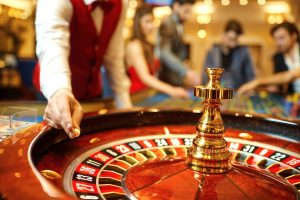Today, all Americans seem to be gambling enthusiasts. There are many opportunities for this in the country – federal lotteries and various state lotteries, traditional horse races and greyhound dog competitions, as well as various types of casinos – “Indian” (located on Indian reservations), commercial (owned by companies and individuals) and, finally, on-line casino on the Internet. While more and more gamblers are betting, there are a few among the citizens who are calling for the wheel of history to be turned back.

At the next stage of this confrontation, the US Congress entered the fray: it created the National Gambling Impact Study Commission, whose task was to assess the “social costs” of this type of activity, as well as to study all the possibilities of legal regulation in this sphere. In addition, the members of the commission were required to make an analysis of the costs of such regulation, which probably involved a requirement to carefully consider alternative (non-state) methods of control. Surprisingly, they did not cope with the last task. Moreover, the commission’s work left one very important point unrevealed, namely, that for the vast majority of people, gambling is just a form of entertainment, a voluntary and harmless activity that is “worth it” because it sometimes brings rewards. In short, such activities are no less healthy and sensible than other sources of entertainment such as television, opera, or competitive sports.
Maintaining a high level of integrity in the gambling industry is in the interest of all of us. However, this is best achieved on a voluntary basis, ie. by certifying private companies through independent third parties. Therefore, the federal government should not respond to public pressure and interfere even more in the gambling business. For their part, the states must also recognize that prohibitions, even in the form of state licensing and control, lead to the substitution of corruption for entrepreneurship, so gambling must be made subject to harsh market conditions, starting with lotteries. It is high time for states to give up their monopoly rights in this area.
After all, facing uncertainty and risk is at the core of life and is the key to prosperity. There may be risks inherent in gambling, but we must not forget that government intervention also involves risk. Coercive measures aimed at eliminating or restricting the gambling business are in conflict with human nature. Legislators also need to weigh the risks when making decisions.
Introduction
Gambling is back in the public eye, along with smoking, alcoholism and skiing without a helmet. In 1996, the US Congress created the National Commission on the Impact of Gambling, which was supposed to “conduct a comprehensive study of the impact of gambling on the social and economic environment in the United States”. However, instead of a “comprehensive study”, the commission limited itself to reviewing a rather narrow field of activity. In particular, the program of her work declared the desire to get to the bottom of the “problem of pathological addiction to gambling”. The goal is beautiful in itself, but in light of the constant pressure for government intervention in this area, any study of the impact of gambling must also consider the impact of government regulation on gambling.
As for the pressure, it really exists. Outraged moralists, irritated that gambling is supposedly a threat to social virtues, are already fed up with the state’s liberal attitude towards gambling, and therefore they have expanded their political campaign to the federal level and expect concrete action from the government. The goal of opponents of gambling is “a containment strategy designed to minimize the moral hazards that gambling exposes individuals and society as a whole”.
By bringing up “moral hazard” (i.e., danger to people’s morals) as an argument against gambling, proponents of this approach paint us a bleak picture of how parents, forgetting about their family responsibilities, completely indulge in gambling and waste dollars, received under welfare programs, and their children, dissatisfied with this state of affairs, give vent to their feelings and take revenge on society, destroying everything around. However, the evidence in this regard, some of which we will discuss below, indicates that such accusations are made up out of thin air. The main danger – for individuals and society as a whole – is that crackdowns designed to control or suppress gambling will simply undermine the integrity of government officials, judges and police and increase corruption. At the same time, such measures are hardly possible to force gamblers to give up their addiction.
Moreover, the government’s “containment strategy” is clearly useless and incapable of preventing coercion or fraud in relationships linking players to casinos, bookmakers, etc. All that is needed in this area is strict adherence to the terms of the agreement and the willingness of the owners of gambling establishments to obtain evidence from a third party that they are playing a fair game. The paternalistic policy of the government in the field of gambling is—along with the violation of the freedom of players and others – a mockery of the idea of \u200b\u200bpersonal responsibility, which is hardly the best method of maintaining the moral health of the nation.
For that matter, such a policy has a negative impact on the economic environment. This moment may have escaped public attention, but our country is by no means in an economic recession caused by the addiction of its citizens to gambling. On the contrary, with the rapid growth of the gambling industry over the past two years, the US economy has shown impressive progress. The gambling business is booming today. The vast majority of states are enthusiastically promoting homegrown lotteries, and the casino business is booming. According to a recent study by Harrah’s, in 1996, 32% of American households gambled at a casino. On average, these persons visited the casino 4.8 times, and the total number of visits was 176 million. Thus, compared with 1995, attendance increased by 14% . It looks like Americans have found a new kind of entertainment for themselves or rediscovered an old one.
The gambling business, about which so many copies have been broken, has a rich and colorful history. Historians Lisa Morris and Alan Block argue that “before the 1840s, the gambling business was organized in such a way that the game was played mainly on steamboats plying the Mississippi and Ohio rivers, as well as on the Great Lakes “. Then, despite the ban – or perhaps because of this ban – underground gambling flourished on land, resulting in the emergence of “several infamous” crime cities “. As for lotteries, they were known in the Old World. Queen Elizabeth authorized the holding of the first English lottery, which was organized in 1569. Later, both in America during its colony of England and in the independent United States, lotteries flourished because they were well advertised and considered a voluntary way to replenish the public treasury. However, the recurring scandals in society took their toll, and in the 19th century political attacks on lotteries led to their widespread ban. The practice of holding legal lotteries returned only in 1963 in the state of New Hampshire , and between 1965 and 1993, 35 states and the District of Columbia introduced state monopolies on the organization of lotteries. Thus, the historical confrontation between the advocates and opponents of gambling continues.

History has taught us a lesson. Despite the noisy campaigns conducted by moralists, the propensity to gamble, in fact, is not limited to modernity and is not unique to Americans. How not to look at this situation, it is inextricably linked with the propensity of people to take risks, i.e. with the most persistent and, perhaps, not such a bad trait of a human character. It has been proven that people enjoy gambling for many reasons, some of which are taken for granted by some but are incomprehensible to others. However, there is a common point of view for all. After all, gambling, by definition, provides an opportunity to try your luck for money . Therefore, at its core, gambling is a combination of risk and some kind of ritual. Both of these components underlie human society and human behavior, so it is not surprising that gambling is ubiquitous.
I will not insist that gambling behavior is necessarily morally good just because it is natural. In many respects, questions of morality are outside the scope of the issue under discussion. If gambling is a vice, the moral aspects of the problem should be dealt with by philosophers or priests, and, ultimately, it is a matter of conscience of each person. My main idea is that coercive measures aimed at eliminating or restricting the gambling business are in conflict with human nature itself. In any case, gambling is hardly dangerous enough to merit heavy government intervention. In short, there are many arguments for and against, but one thing is clear: for many people, gambling is just entertainment. Moreover, to the extent that players balance risk and reward, gambling offers a good opportunity to develop skills that will be useful in life. Both in the market and at the poker table, the one who knows “what cards to hold and which to fold” achieves success.
The Advantage of Gambling
- Different games for big wins in online casinos – Different games offer casino customers many opportunities to get different winnings. In addition to cash winnings, players can also win smaller prizes that include free spins.
- Big Bonuses and Promotions – Welcome bonuses and 50 free spins bonuses are always welcome or cash bonuses. With the exception of new players, a number of casinos offer regular offers for regular players who try to be as active as possible in the casino.
- Various methods of depositing and withdrawing funds – The possibilities of depositing and withdrawing funds attract many players. The more payment and withdrawal methods a casino offers, the more popular it is, one might say.
- Choose your level of security – There has always been and always will be a difference between the best and worst casinos. Good and bad safe ammonia-free casinos can be distinguished by the level of security and customer protection. If a casino is trying to keep its players, asking them to verify their identity or offering them help even if they don’t know they need it, then it’s worth spending your money and time on this casino.
- Customer support can be provided in several ways, the most popular of which are online chat, phone calls, and email communication. Online chat, which has only recently become popular, is the most common and fastest type of communication, since it is offered directly on the casino website, and there is always someone active and ready to answer all your questions. You will not receive responses to phone calls or emails at the same rate because they are simply considered obsolete ways of communicating.
